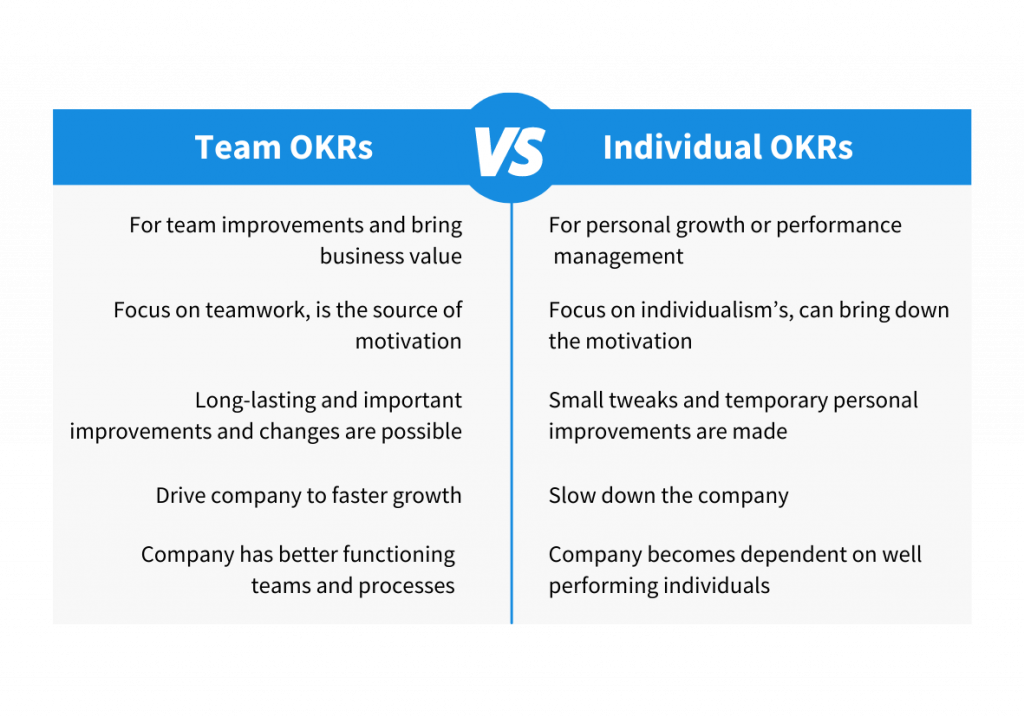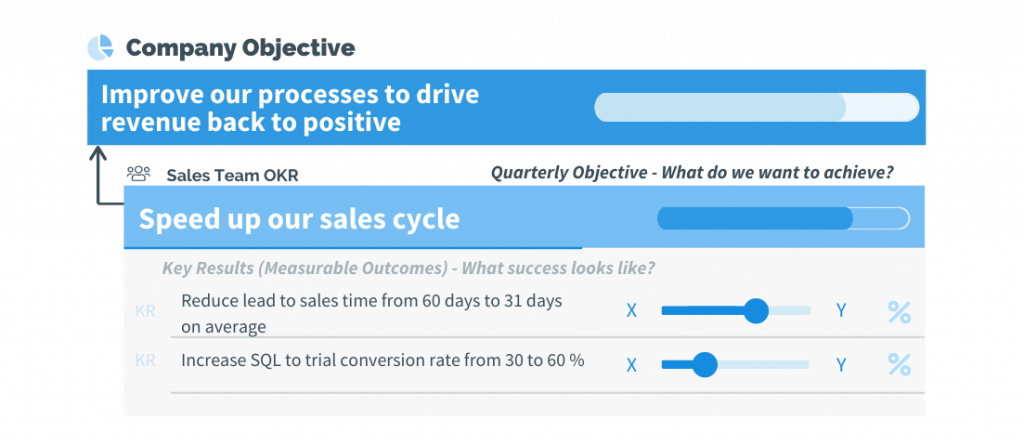There’s a common misconception that in order to succeed with OKRs, they have to be set on an individual level. Contrarily to this belief, personal OKRs rarely produce any business value and instead of increasing accountability, you might miss out on some of the positive effects of OKRs: focus, alignment and clear tracking of business outcomes.
It doesn’t mean that individuals will have no goals to work towards to – it’s a collaborative work towards their team OKRs by setting personal weekly plans and maybe even keeping an eye on a list of individual KPIs.

OKRs need to bring value to your business
Leaders hope that individual OKRs add more responsibility and therefore everyone would take more action. Unfortunately, it’s more likely that people feel frustrated and don’t understand why they need to do it, as it doesn’t seem to have any individual benefits. They set easy and rather task-based OKRs which will not bring value to the bigger picture. Instead of collaborating and creating brilliant ideas together, they struggle alone with small tweaks. And eventually, forcing individual OKRs might just kill any motivation to do OKRs at all.
Many companies have tried to go with individual OKRs with similar outcomes: Google tried Personal OKRs, it didn’t work. We in Weekdone tried it, it didn’t work – and adding to it the experiences from working with our customers over many years, we do suggest to keep your focus on Team OKRs.
Individual goals are important, but their focus should be on personal development. There is a huge difference between setting team goals that drive the company forward versus people developing themselves to have a better career and a happier life.

Different outcomes of personal and team OKRs
Let’s look at an example of Company Blue: It’s a software company that offers productivity and tracking tools for businesses. They have been on the market for a couple of years and are still figuring out some things. For the last 6 months, they’ve been having problems with revenue and it’s clear that a straightforward goal-setting is needed in order to drive improvements and focus on measurable results. They decide to set OKRs and start the necessary learning process and discussions.
Management begins by thinking about what the overall focus should be for the company. After discussing with the team managers they realize that their approaches and processes need to be improved. There are not enough leads, sales take too much time or fail completely, and the product has problems with on-time and bug-free releases. Management decides that the company’s overarching Objective will be: “Improve our processes to drive revenue back to positive”.
Now, it is time for the teams to set their goals. There are two ways how this company can approach OKR settings: first is by focusing on personal OKRs and the second is by focusing on Team OKRs.
Individual OKRs slow down the company
After the management discussion, the sales team’s manager asks everyone to set OKRs for themselves to have better results.
Team members are struggling with setting the goals and it takes about a month before they’ve added their OKRs. People end up writing down how many meetings they need to have, what kind of email templates they need or what sales books to read. Instead of measuring outcomes they would mostly count how many things they plan to do. Everyone is thinking about their own results, but not what sales as a function should improve.
This kind of individual goals are ofter tiring and decrease motivation, as it feel like micromanaging and doesn’t really reflect in business results either. Even the ones that were written well and focused on outcomes didn’t actually help move the team forward. Individual team members are smarter in some ways but if they decide to leave the team, so goes the new knowledge.
If each person has their own goals to achieve, then other problems tend to become secondary.
So instead of working together as a team, people might end up competing with each other to have better results on their goals. As no one was focused on setting actual measurable and business value-oriented Key Results on a team level, they don’t know how much or if anything was improved. Or even what or how exactly they were supposed to improve.
Let’s take a step back to the beginning of the story. Now, instead of asking people to set their personal goals, teams will set their OKRs together.
Keep the team OKRs in focus
The company shares it’s overarching Objective “Improve our processes to drive revenue back to positive”. Now it’s time for the teams to set their contributing OKRs.
The Sales team knows that the current approaches do not work and they need to change something to start selling more. After team discussions, they have concluded that something is up with their sales process: it takes too much time to close the deals and many potential customers seem to get tired in the process so they go to the competitors. The sales team chooses to set a quarterly Objective “Speed up our sales cycle”. It contributes to the company’s Objective and should eventually help to increase revenue.
After agreeing on the Objective, the team also sets the Key Results:
KR1: Reduce lead to sales time from 60 days to 31 days on average
KR2: Increase SQL to trial conversion rate from 30 to 60 %

Now that the OKR is agreed upon, the team starts working on achieving it. Even though it’s a team goal, each person has their own role and responsibilities.
Team members set weekly plans they will be executing and update these plans regularly. The short weekly check-in meetings are for sharing the learnings and it also keeps everyone accountable. Together they measure the progress of Key Results and discuss any occurring challenges.
They’re working together as a team, so it’s possible to make decisions that have a bigger impact and change how sales operate. Everyone can test new ways and collect feedback, but it is later shared and conclusions are made based on the experience of the whole team, not just one person.
At the end of the quarter, the Objective is achieved with really satisfying progress of 82%. Sales take less time and fewer customer drops off in the process which means it should helpt to increase the revenue as well.
As there’s constant communication around team’s OKRs and alignment in execution, the process will improve their knowledge collectively. And once the team Objective is accomplished, the positive change is rather long-lasting or even permanent in some cases. Whenever some of the team members are absent, the team is still functioning well as the improvements have affected sales team as a function and these new ways can be applied by anyone.
Key takeaways
Personal OKRs are valuable for personal growth
Personal growth is very important, but teams need to focus on their collaborative growth to improve the business. For that, teams need to keep their focus on team-level goals. Individuals can always set their own goals as well if they want, but it is not something that should be demanded from people.
Personal OKRs set limits and end up driving small tweaks
It’s not often that personal OKRsdrive actual positive change on a team level. Rationally speaking, one person in a team of 5 can’t change that whole sales process. But when the team works on it together, they are more likely to succeed in changing the sales process as a whole.
Personal OKRs can drive people to be competitive and divide the team
Team OKRs encourage collaboration and exchange of great ideas, but setting them individually don’t often carry these benefits. With Team OKRs, people aren’t struggling with the challenges alone – these become team challenges that will be solved a lot quicker because many heads are put together.
Personal OKRs make the company dependent on certain persons while team OKRs improve the whole team as a function
The positive changes made while executing Team OKRs are long-lasting vs having small personal changes that are always dependent on a certain person’s effort. Teams should not lose their capability to function and deliver good results if people leave the company. Of course, if new people join the team, it takes time to adapt but if the team has everything in place then the results follow fast.
Team OKRs are a lot more motivating
Team members can work together on things, encourage each other and help each other out with the challenges. Results should be celebrated together! It’s much better than constantly worrying if I can achieve enough on my personal goals, and what should I even do.
Personal OKRs slow down the company
OKR principles are hard to follow on an individual level, so imagine the time and effort it takes for every individual in a company to set them. Then the managers need to make sure that all of these somehow align with what the team or company wants to do. A lot of back and forth reviewing and agreeing. Eventually, you will have tons of tasks listed as Key Results and focus from business-valuable outcomes is shifted to just doing things.
Great things in business are never done by one person; they’re done by a team of people.
Steve Jobs
